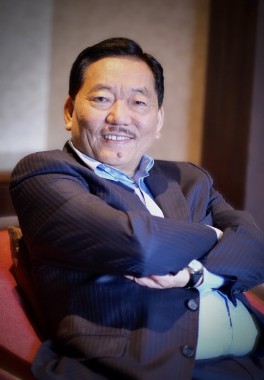




















Friday, May 16, 2025 12:00 [IST]
Last Update: Friday, May 16, 2025 06:24 [IST]
GANGTOK, : Former Chief Minister Pawan Chamling has extended his heartfelt wishes to the people of Sikkim on the historic occasion of Sikkim’s 50th Statehood Day.
Our decision to embrace democracy was a profound expression of nationalism—made possible by the leadership of L.D. Kazi, his patriotic team, and our visionary forefathers who championed the movement for democracy, said Chamling in his message.
The former Chief Minister expressed that in these 50 years, Sikkim has established a unique identity for itself—both nationally and globally.
“Of these 50 years, the SDF government led the State for 25 years, setting a national record for the longest-serving government in India. I feel fortunate that during our tenure, we were able to bring about transformative changes across all sectors. We reduced the Below Poverty Line (BPL) population from 41.43% in 1993 to just 3% in 2019. The World Bank recognized Sikkim as the State with the fastest poverty reduction after World War II. The Human Development Index rose from 0.582 in 1996 to 0.665 in 2006. “
“Alongside this, we ensured full coverage of essential services like drinking water, electricity, and roads—making Sikkim the State with the highest road density in India. We also made Sikkim a kutcha-house-free State. Health services were made free and people-centric, and the basic minimum needs of every citizen were met,” said Chamling.
The former Chief Minister reminded that in the area of education and human development, the SDF government, during its tenure, introduced free education and established university-level education in the State. “During this time, Sikkim became the third most literate State in India. Life expectancy also improved significantly—from 62.7 years in 1990 to 73.15 years in 2016—placing us well above the national average. These achievements reflected our commitment to building a healthier, more educated society,” he said.
The former Chief Minister added that his government secured tribal status for the Limbu and Tamang communities and ensured Sikkim’s inclusion in the North Eastern Council. “We instituted 50% reservation for women in Panchayati Raj. Sikkim became a model State for social justice and equality, and we backed this vision with substantial investment, making Sikkim the State that spent the most on social development. We also allocated 70% of the State budget to the rural sector,” he said.
Chamling, while speaking on environmentally sustainable developmental model, recalled that Sikkim gained global recognition as the first fully organic State in the world, earning the Future Policy Gold Award from the Food and Agriculture Organization of the United Nations in 2018. Sikkim became the first State in India to be declared a Nirmal Rajya in 2008, exemplifying our commitment to sanitation, clean living, and environmental responsibility, he said.
The former Chief Minister also recalled other achievements and milestones achieved during the five terms of SDF government, and shared his opinions on the future ahead for Sikkim.
“Today, as we look to the future at this profound juncture, we must ask ourselves how we can build on the foundation of the past 50 years. How do we pursue economic growth while safeguarding the heritage, culture, and history that make us uniquely Sikkimese? How do we confront the dual crises of a declining Total Fertility Rate and rising influx? Can we create a self-sufficient State with a skilled and confident population that not only competes but excels nationally and globally? How do we protect our legacy, unique identity, and status enshrined in constitutional safeguards like Article 371F?,” Chamling asked.
The former Chief Minister also flagged broader global challenges like the GLOF disaster of 2023.
“Technological disruption, environmental risks, and geopolitical tensions—as seen recently in the war-like situation between India and Pakistan, which underscored the strategic vulnerability of Sikkim’s location—all pose serious questions for our future. We must be prepared—not just to survive these challenges, but to lead with resilience, wisdom, and innovation.”
“As we commemorate 50 years of democracy in Sikkim, we also stand at the threshold of a new era. The next 50 years will bring fresh trials—but also immense possibilities. Whatever we have achieved, and whatever we are today, have been possible because we are a part of India. As Indian citizens, the people of Sikkim today have the opportunity to contribute to the nation on equal footing with all other citizens. But with this opportunity comes great responsibility,” said Chamling.
Chamling highlighted that through hard work, perseverance, and a strong vision that Sikkim will continue to make our mark on the national and global stage. “As we complete 50 years of Statehood, let us move forward with unity, purpose, and resolve to shape a future that honors our past and fulfills the promise of generations to come. Let us forge ahead, protecting our hard-earned democratic values while envisioning a grand future for Sikkim,” he said.
